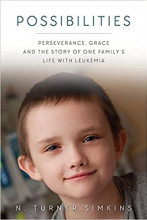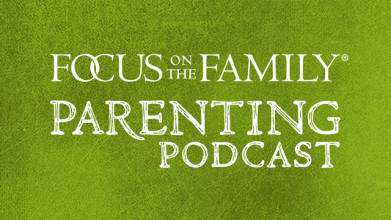John Fuller: Four years of hospitals and treatments, three relapses, two faith filled parents, one brave boy, and one God, our God, who does, uh, what the world says is impossible. That’s the story that you’re going to hear today. Um, the story of Brendan Simkins. His parents are here, Turner and Tara, and your host for this Focus on the Family broadcast is Jim Daly.
Jim Daly: Uh, John, perseverance is referenced several times in the New Testament. In Hebrews, uh, Christians are told that we need endurance. In Philippians, Paul mentions pressing on to the heavenly prize through Christ Jesus, and in James, uh, being Jim I like that book-
John: (Laughs).
Jim: … uh, we’re told that the crown of life is waiting for those who persevere under trial. And, uh, as an orphan, man, I know when life feels like you’re trudging uphill in four feet of snow and it doesn’t seem to be getting easier. And in that context, perseverance can be hard. Uh, it can be so difficult to find the courage to take even one more step forward. But what I think is really interesting is that the verb perseverance as it was originally written in the Greek, didn’t simply mean to patiently stay in a difficult situation, but it implies action on our part. Um, in other words as Christians we’re not called to simply keep going, we’re called to be active participants in the stories God has called us to be a part of, trusting him with the results. And our guests today are very inspiring, uh, couple, and their son as well.
John: I would agree, Jim. Uh, Turner and Tara Simkins are co-founders of the Press On Fund, which is a non-profit established to identify groundbreaking alternative therapies for children with cancer, and they have, uh, three teenage boys.
Jim: Turner and Tara, welcome to Focus on the Family.
Turner Simkins: Thank you for having us.
Tara Simkins: Thank you.
Jim: Uh, let’s jump right in. Uh, from the time your middle son, Brendan, was a baby, you had a feeling … And I kind- I thought this was interesting in the book. Uh, but you said you had a feeling that God had something special in mind for him. Uh, describe that feeling and what was your reaction to it?
Turner: It’s difficult to articulate. I mean, from the first moment that I held him and there was something about … He just- there was a glow or an energy about the kid.
Jim: You can just tell.
Turner: And then from the point that he could interact with us, he was always reaching out. I mean, he was always wanting a hug, he was always happy, and he was always … He was sort of the glue between … Once his little brother, Christopher, came along, between the- the three of them. And then he had- had this prodigious hand-eye coordination in just about everything he did, and … I don’t know, it was just a feeling. Uh, I don’t really know how to say …
Jim: Just something caught your attention.
Turner: There was something about the kid, yeah.
Jim: You actually had a friend that also said something to you about him like that.
Turner: Yeah, that were- this- you know, every now and then you remember a conversation.
Jim: Yeah.
Turner: I don’t- that was relatively … Um, it was late- later in the evening, so I’m glad that I recall it, but, you know, when someone says that … You know, he was looking at him, uh, and- at a photo of him, and having seen him earlier in the day … I remember my- it was his god-father, Frank, and he said, “You know, there’s something about this kid. Uh, I think he’s gonna do something special.”
Jim: Wow. That- that’s amazing, that the Lord would give you that, because that, I’m sure, became a strength for you as you began to unfold what happens. And we’re gonna get to that. Uh, but tell us about Brendan as a child. I understand he was, uh, showing major promise in his golf game. (Laughs).
Turner: Yeah.
Jim: Dad was proud of that I’m sure.
Turner: Yeah, we all are. You know, and it would … He wa- he was- people were talking about him at, you know, five years old.
Jim: Wow.
Turner: I mean, he was even entering these junior events.
Jim: So, he was good.
Turner: We live in Augusta, Georgia area. P- kids play golf relatively young-
Jim: (Laughs).
Turner: … and competitive. I mean, I know they do everywhere. But, um, yeah. I mean, he could chip and putt, and- which is very difficult for most of the younger kids out there.
Jim: Yeah.
Turner: I mean, usually … And, uh- and he had a beautiful swing, and, um …
Jim: (Laughs).
Turner: And he- I remember looking at the- the video of Tiger Woods when he was about that age-
Jim: Yeah.
Turner: … on the Johnny Carson Show, and thinking, I said, “Well, Brendan can do that, too.” You know? So, um …
Jim: Yeah. Like a good dad, you’re saying he- he’s even better.
Turner: I think any dad… Just, you know, I mean, I’m- you know, it was a … But yeah, and then of course, you know, Tara you had, um, as a little kid, you- I mean, you saw a lot of that in him as well.
Tara: I did. It’s very special.
Jim: Little of mom’s insight there.
Tara: Yeah. They’re all special.
Jim: So, he gets to his seventh birthday, or almost to his seventh birthday, and he suddenly starting showing some signs of illness. Tell us about the night that he was diagnosed, and what were the two of you, as mom and dad, feeling and thinking? And this is where people that are going through hard stuff right now with their own, the diagnosis that somebody may have just gotten for their child, this is where we’re all gonna lean into the story. So, tell us about that day. What was unique about it? What caught your attention? And why did you take him to the doctor?
Tara: Well he had started … As Turner said, he was this very active kid, and his brother was in the third grade, and he was in the first. And he was so fatigued over the Christmas holiday, and we thought that it was just … He was trying to cut- stay up-
Jim: Stay up with his brother.
Tara: Yeah, stay up with his brother and all the third graders.
Turner: He was complaining about his leg hurting.
Tara: And he was complaining about leg pain, and the grandmothers had said he was pale. So when he was complaining about his leg pain, I took him to an orthopedic- pediatric orthopedic surgeon who was a friend of ours, and he did x-rays and all of this, and he said he’s absolutely fine, but the next time you go to your pediatrician you might want to ask for some blood work.
Jim: Huh.
Tara: So I just kind of put that in the back of my brain, and we had taken all of the kids up to the mountains to see snow, and all the kids were out there playing, and Brendan was just too tired. And then all three children-
Turner: All the kids were making snowmen, snowball fights, and he’s in the bed.
Jim: Really?
Turner: And so that would- we had a walk with Tara’s sister that day, and we had just this heaviness just … We- we sort of knew then … Or we didn’t …
Jim: You knew something was probably not right.
Turner: [crosstalk]
Tara: We knew something was not right.
Turner: But I mean, it was ominous. I mean, there was, um …
Tara: And then we … Then they all had a fever, so we cut the trip short and we went to our pediatrician. The two boys had ear infections, and Brendan did not. And thankfully I had the doctor’s instruction in the back of- of my brain, and I said, “Would you mind doing some blood work?” And he said no problem. So, I went to go to my law office. We- uh, the kids went with the babysitter, Turner went to work, and I kept waiting for that phone to ring. And lunch went by and no- no phone call, and after about three o’clock I knew, like, this is a phone call a doctor’s gonna make. And at five o’clock I got the call from the doctor.
Turner: Because usually a nurse will make that call.
Jim: Yes.
Tara: Right. Nothing wrong.
Turner: When the doctor calls, it’s- you know …
Jim: It’s not a good sign.
Tara: It’s not a good sign. And so, they said, “There’s something suspicious in the blood work. Go get Brendan, come back to the hospital.” And we were … I remember thinking, driving to go pick him up to meet Turner, I’m like, leukemia … It just was-
Jim: So, you thought it.
Tara: … on my heart. I thought it. And I even called his godmother and said it.
Turner: Wh- well before- yeah- but- yeah. But you remember, we had to go to the fifth floor of the children’s hospital, and that’s the oncology floor.
Jim: So, the- okay, now the pieces are coming together.
Turner: And as soon as you get off the elevator … And there was this really sweet kid, um, who we became close with who actually, um … It’s a whole nother story, but, um, that’s just when you knew. I mean, you saw the kid with no hair and the bag of blood, and-
Jim: Sure.
Turner: … all these other things hanging off, an IV pole.
Jim: All the devastation of that.
Turner: And then it was- then you knew that things would change.
Jim: So, what- I mean, what did they say to you, the doctors, when you got the news. What was said?
Tara: Your child has cancer. Your child has leukemia. I mean, I- …
Turner: It took a little while. It took them several days to pinpoint exactly what it was. At first, they thought he had ALL, which is the more common form of, um, childhood leukemia.
Jim: Yeah.
Turner: And, um, and then they thought it was aplastic anemia, um, which is, you know, another terminal blood disease. And then finally it was AML.
Jim: And AML is?
Turner: Acute myeloidal leukemia. And he had a weird subtype of it. It was a chromosomal deficiency called 7Q deletion.
Jim: That’s a very aggressive cancer, correct?
Turner: Yeah. It- yeah. It’s one of the most difficult of the childhood cancers, um, to cure. And, um, and fortunately we had our head in the sands a little bit-
Jim: Yeah.
Turner: … at that time, you know? So, we didn’t take on the- you know, the fear that we would have had, you know, in retrospect. So, at that point we’re thinking, okay, we can do this. You know?
Jim: He’s gonna beat it.
Turner: We were positive-
Jim: You were in a good place.
Turner: … you know, like, we were, um … And, um, but, you know, that was short-lived obviously.
Jim: That was short-lived. But I want to … I want to hear your hearts on this-
Tara: Right.
Jim: … as mom and dad. Talk to me as mom and dad, when doctors say that. And people listening, they may have heard it, or they’re going to hear it. And I want you to connect with them because that’s a moment where you can go a lot of different directions. In your faith-
Tara: Yeah.
Jim: … in your anger.
Turner: Yeah.
Jim: What happened to you guys? I mean …
Turner: It’s all of that. I mean, it’s- it’s almost like a cyclone of emotions and thoughts at that point.
Tara: I- I think that to answer your question, there’s a process … The- just human nature, right? You start to … First you a- approach this as a business problem, or something that, you know, I- we can handle this, right? We can handle it. And I remember, I had had a friend who was a pediatric oncology nurse, and she says, “It takes families seven times to hear your child has cancer before the full effect of that actually falls in on them.” And I remember that night we were so naïve. We’d taken him to the hospital, and we were, you know … It’s like, nine o’clock at night, and we go, we’ve got two other kids at home.
Turner: Yeah.
Tara: We’ve got to get them to bed, like-
Turner: They’re like, “You’re not going anywhere.”
Tara: … let’s hurry up this op- operation. And they said …
Turner: They said there’s a- there’s a cot for y’all, but you’re not going anywhere tonight.
Tara: Say you’re not going anywhere, so … Like, things, it takes it a while to sink in. And then I remember the next day when the oncologist walked into the room who was on call that day, and she happened to be an acquaintance, and she hugged me, and she sobbed.
Jim: Wow.
Tara: And she said, “I am so sorry.” And at that moment I thought, oh my gosh, we have no-
Jim: This is big.
Turner: This is- this is a big deal.
Tara: … idea what the depth of this is.
Jim: Yeah.
Tara: And then I remember, you’re kind of caught between two worlds, right? You’re trying to go through … You still have all the daily duties.
Jim: Well right.
Tara: Laundry-
Turner: Yeah.
Tara: … getting the other kids to school, their lunches prepared, their …
Turner: You know, at that point we didn’t even know what we were doing with our jobs or any of that stuff.
Jim: Well, are …
Turner: I mean, that- you know, again, it just …
Jim: Are you in a fog? Are you trying to say, “Okay, what do we got to do today?”
Tara: You’re- you’re almost hyper focused in a sense that … Like, I think military, um … You know, when you’re- we’re on a mission, there’s the fear that focuses you that allows you- you to focus on things also distracts you from the depth of what’s going on with your heart. But I remember that as the days went by, the fear- that that understanding grew, that what we were getting ready to go through. And Turner’s sitting there reading … We were in the hospital room; we were able to stay there as a family and sleep. And so, he’s going through the protocol with all the side effects, and it’s terrifying. And then I just hear this voice and it says, “In the midst of fear, fall deeper into love. In the midst of fear, fall deeper into love.” And I knew that we were being told to trust, to trust in something … It gives me chills. Trust in something bigger. I will hold you through this.
Jim: Yeah.
Tara: Right? You will be held through this. You will not go through this alone. And so …
John: Mm-hmm. That is, uh, phenomenal encouragement, and that had to be God speaking to you, right?
Tara: Right?
John: And, um, if you’re tracking along with any aspect of this story, uh, please know that we have caring Christian counselors that you can talk to here, call and, uh, schedule a consultation with them. We have resources, and, uh, our phone number is 800, the letter A, and the word FAMILY. Or online you can find help at focusonthefamily.com/broadcast.
Jim: So, um, Brendan goes through his first bone marrow transplant. The doctor sits you down and says what?
Turner: Well, he’d sailed through transplant. Um, so we- it was- it was almost a little too easy.
Jim: So, you thought things were going in a great direction.
Turner: Well, we did, but there was a little … We were also told that, you know, post-transplant, there needs to be some signs of friction.
Jim: Yeah.
Turner: Fevers, um, rashes, certain things to show that this new immune system-
Jim: Is fighting. Yeah.
Turner: … is effectively taking over and will hopefully see the cancer as something bad and foreign, is fighting something. Um, and none of that happened. That- you know that day is the one where you’re- the cyclone really kicks in. Tara and I actually got physically lost driving home, (laughs), in the car on a road that we’d traveled … You know, all of the sudden I took an exit, and I didn’t even know- because my mind was just everywhere.
Jim: Well, because you heard there’s no more hope.
Tara: Well, he said, “There’s no curative option.”
Jim: Mm-hmm.
Turner: Yeah. He- they- they gave him two months.
Tara: He said, “Call hospice. Go to Disney World. There’s no curative option- option.”
Turner: Yeah. He said …
Jim: Oh, my goodness.
Turner: Yeah. I mean, it was- it was very just black and white.
Tara: It was awful.
Turner: I mean, he was sympathetic. I mean, he wasn’t [crosstalk]
Jim: This is a tough thing for doctors to do.
Tara: It’s a tough- right? It’s so kind, but- and- and a part of that kindness is the directness, right?
Turner: Yeah.
Jim: Right, but- but the difference was you did not react in a way that said, “Okay, I guess this is over. Lord, you have our son.”
Tara: Right.
Jim: “Thank you for the time we had.”
Turner: Yeah, we had- we- we had a little kick in the pants in that regard.
Jim: What- and talk about that? What happened?
Turner: It- it was- it- wh- w- one of our close friends who I went to college with, and actually from Augusta, his son had neuroblastoma, and his son, Patrick, had relapsed which is not a good spot to be. And, um, and that’s a very difficult disease to survive it, relapse. They were in Philadelphia at Children’s of Philadelphia, we’re driving home, we call Steven and tell him what’s going on, and- and you know, we’re talking about this gloomy, um …
Jim: Sure.
Turner: But and he said, “You know, screw that.”
Jim: Forget it.
Turner: I mean, straight up, like, he goes, “Man, no.” And so, we kind of looked at each other. I mean, it was kind of what we needed. I mean, it’s like the football coach saying, “Get back in the game, guys.” You know? And, uh, we knew that, um, you know, we were certainly behind, um, but we came home and we- we got everybody that we knew who had a connection. We rounded up the troops and we started making phone calls.
Jim: Yeah. And Tara, you-
Turner: And …
Jim: … kind of had that mama bear thing, right?
Tara: (Laughs).
Jim: You were like, kick it into gear. Let’s go. Right?
Tara: It was- it was a bit of defiance. I think, um …
Jim: What did that sound like in your mind?
Tara: It- it …
Jim: I mean, some people will say, “Okay, it’s over.” You didn’t …
Turner: Well, that part is … Yes, you’re right. And that’s what worries me.
Tara: I- I think that one of the- the places of grace that we had was we weren’t alone, right? We knew we were not alone. We knew we’d been promised that we would be walked through this not by ourselves. Our friends were so important, the fact that we had a community another family who was going through it. But we saw all kinds of families. Single moms, children that never were able to come to the hospital, and there was always … Well, what is it that we can do? How can we serve? How can we be of use? What is a better question that we can ask instead of why us? How might I be used? How might I be of service?
Jim: So, as we work through this though, I mean, we have about 10 minutes-
Tara: Yeah.
Jim: … and I want to make sure we grab all of this. Um-
Turner: It’s a long story, it’s hard to do.
Jim: … Turner- no, no, no. But it paints an- an incredible picture.
Turner: Mm-hmm.
Jim: The second transplant didn’t take. The third transplant …
Turner: Well they did take and get … You know, there’s a difference in … The- the transplant took, but then the cancer came back.
Jim: In each of those second, third times?
Turner: In each of those situations, right.
Tara: Mm-hmm.
Turner: So, I mean, we defied all the odds. He’s- you know, the second one he survived. The third one is a parent as a donor. So, think about that. That’s a half a match. You know, the child is half Tara, I mean, he’s half me.
John: And- and you were the donor for that third one, right?
Turner: I was the donor for the third one. And it took, and then things went haywire.
Jim: Right.
Turner: And we, um- he was given last rites and we brought his brothers in to tell him goodbye.
John: Mm-hmm.
Turner: Um, he was on a ventilator, and- and you hear about it, but you could feel it. I mean, it was a physical energy of peace knowing that you have peeled off the things that don’t [crosstalk]
Jim: You’ve done everything you can do.
Turner: You’ve done everything that you could, and it was … I mean, it’s hard to describe it, but …
Jim: So emotionally you’re saying goodbye to Brendan at this point.
Turner: Yeah.
Tara: Yeah.
Jim: I mean, maybe …
Turner: And we had- we had never done that before.
Jim: Inside your heart.
Tara: Yeah.
Turner: That day- yeah. I mean, because we had almost all of the doctors and nurses, and, you know, child life specialists, all were in the room. They’re all weeping, then, you know, and I remember a doctor in Philadelphia saying, “I tried a tr- second transplant on a kid, in less than a year in he died a pretty gruesome death on a ventilator.” And so, I- that never left my mind.
Jim: Right.
Turner: And so, here’s this kid, third transplant and he’s on a ventilator, and, um …
Jim: And then the decision to try for a fourth.
Turner: But then he- but then he came back. You know, and then, um, yeah.
John: So, Tara, did you still have that sense of, we can get through this?
Tara: I always had the sense that we could get through this. Without being hopeful of what the outcome could be, but without having to need the outcome to-
Turner: To define it.
Tara: … prove it, and to define it, that we were held. Right? There’s-
Jim: Yeah. Describe that a bit more.
Tara: … there’s a different- there’s such a difference that we didn’t have to say, “God, you’re gonna prove it to us by saving our son.” Right? Like, we’re gonna have faith and that we need this outcome to happen. It was this, you know … In the midst of fear, fall deeper into love, was we always had this moment, and the question was, how can we feel love and be channels for that love in this moment, and allow it to be enough? And that was our human struggle, which I do think Turner does such a beautiful job in the book. Because the science is one thing, but we were talking about a daily living in the practice of some hopeful expectancy, and trust, and belief and some kind of mixture all- of all of that, with some type of confidence in the … I remember during this time, at the root of confidence is confido, right? Walking in faith. So, we knew that this was all of that. And at the point Turner describes is the ultimate letting go, that peace that passes all understanding, that we read about, right?
John: Mm-hmm.
Tara: That’s the ultimate letting go. It doesn’t mean that we didn’t have any of those feelings, that we didn’t have any of that doubt, that we didn’t struggle. But that became an active part of that walk of faith.
Turner: What she’s talking about is really, you know, the one thing that we were taught through that, because you’re in this cocoon, submarine, I mean, whatever you want to call it. The rest of the world is going on outside. And I realized, if I’m afraid of the outcome, or worried about the outcome, or angry about why we’re here, I’m gonna lose this moment that I have with this kid with me right now.
Jim: Wow.
Turner: And his brothers. And if I lose … And- and- and that moment may not be here 15 minutes from now, and p- in his case. I mean, because [inaudible]. I mean, when you’re going through the mundane things of life, I mean, it’s easy to kind of have that-
Jim: Right.
Turner: … smothered up a little bit. And so, this situation peeled off all that mundanity. And, you know, when you’re in an environment, once you get to St Jude Children’s Hospital, I mean, these are … A lot of these kids don’t come out.
Jim: Right. They’re in trouble.
Turner: And you see lots of reactions. You see divorce. Um, there’s an extremely high rate of divorce-
Jim: Yeah.
Turner: … in pediatric cancer. Um, and that was …
Jim: Well that- and that’s part of it. Um, you guys were able to hold together. I mean, even through this very stressful time. And the good news is Brendan received that fourth transplant and it did work, and he’s now doing great. He’s 17.
Tara: Yeah.
Jim: He’s no longer that seven-year-old, eight year old fighting for life in the way he had to. He’s doing much better, right?
Tara: He is.
Turner: Yeah.
Tara: He’s- he’s remarkable. Yes. He’s 17. He has a lot of side effects from his treatment-
Jim: Yeah.
Tara: … but again, we’re just so grateful. And if we can remember to stay in that place of gratefulness, that this is what we prayed for, even the days I want to strangle him … (Laughs).
Turner: (Laughs).
Jim: No, the- the normal stuff.
Turner: Yeah.
Tara: I’m like, I prayed for this moment.
Turner: I remember saying to Tara, like, you know, we prayed for this now.
John: Normal is good. (Laughs).
Turner: (Laughs).
Tara: I remember, like … (Laughs).
Turner: We got it, here we go.
Jim: (Laughs). Yeah.
Tara: Like, remember that we did this. But when talking about that specialness of Brendan, and I do … I think for parents who are go- out there, that child never doubted that he was loved. Right?
Jim: Mm-hmm. He was a fighter.
Tara: He was a fighter. He never felt abandoned.
Turner: That was the thing that we saw.
Tara: He never felt abandoned by God-
Turner: Yeah.
Tara: … he never felt abandoned. I mean, we- I had people write letters that said, “This child is paying for the sin of you and your ancestors, and blah blah blah.” And I would just, like … Oh my gosh, so that’s hurtful, but …
Turner: No, it- it was an interesting- or that we were being Frankensteinian-
Tara: Right.
Turner: … in some way, and making this kid endure-
Tara: Um …
Turner: … things that he shouldn’t endure.
Jim: Well- yeah.
Turner: And we knew where he-
Tara: But he wanted it.
Turner: … I mean, you know … But he- all right. He was seven. Remember this.
Jim: Yeah.
Turner: So, we were trying to cocoon them. Well once you’re out of transplant relapse here at St Jude, kids start dying. I mean, the gig’s … I mean-
Jim: Yeah. People know.
Turner: … the cat’s out of the bag, right? So, I mean, it’s- and our kids would go to funerals of other children. I mean, that’s not something … When you go do that on a semi-routine basis at the age of seven on, that’s … It’s- it had an impact on him.
Jim: But you know what was- what was good? This is the quote of the book that really got a hold of me. You said, “The interim nature of childhood itself should be sufficient to hold every one of our kids tight for every possible second. We should not need cancer for this.” Man, that is powerful.
Tara: Right?
Jim: I mean, you guys went through a traumatic experience where your son almost died not once, not twice, not three times, but almost many times.
Turner: Right.
Jim: And that fourth bone marrow transplant … And if you don’t know anyone who’s done a bone marrow transplant, I have a good friend, Chuck Bolte, who just went through that. And it is horrific.
Turner: It’s brutal. It’s brutal.
Jim: It’s brutal.
Turner: Mm-hmm.
Jim: It takes about a year to recover.
Tara: It does.
Jim: If everything goes ri- well. And I’ve just been watching that from a distance, and to hear when your son went through four of those-
Turner: Mm-hmm. In 18 months.
Jim: … in a short period of time, it caught my attention. It was like, this is not- this isn’t even normal for someone who’s going through that.
Tara: Right.
Jim: The other aspect of it is your attitude to fight. And I just so appreciate that you didn’t give up after the first situation where it didn’t- it didn’t work.
Turner: Mm-hmm.
Jim: And, uh, you didn’t give up as parents. That’s a good lesson for all of us when it comes to medical issues that we may encounter at some point. I hope the people listening will take that as a declarian way forward.
Turner: Please.
Jim: If they- if they’re given a- a poor diagnosis-
Turner: You’re not gonna hurt anybody’s feelings if you get a second opinion.
Jim: … keep trying.
Turner: I mean, you may be on the right track, but you need to make sure-
Jim: Keep fighting.
Turner: … you- wh- you need to make sure that you’ve got all the cards on the table.
Jim: Yeah. And I so appreciate that. The last question, which is really perhaps the most difficult, and my own brother and his wife went through this, uh, cancer with their son. And he was doing well, but then it got him again and he didn’t make it, at a young age. And so, I think the question is a tough one, but it’s for those families that did fight the good fight, but they lost their loved one, they lost their child, their son or daughter. What word would you have for them?
Tara: I- I have enough. This understanding that every human’s life is enough, that whatever it is that they were meant to be, to love, whomever they were- they were born to touch, they did. They touched them, and that it was enough. And to find some peace in that, right? To find something in that. We can spend our entire rest of our lives what if-ing, second guessing, and if we’re doing that, we aren’t living the lives that we’ve been called to do.
Jim: Yeah. And it- you’re really saying contentment has to be your goal, that you can’t control these outcomes, and that you need to find contentment.
Tara: Yeah.
Turner: Everything has a consequence, every little seed in the ground, every little pebble in the pond, and we may be a long ways off before that matures into … And we may never know what it is, but it’s something. And each of those children who’ve been in the hospital have touched someone. They’ve touched another family; they’ve touched another doctor.
John: Mm-hmm.
Turner: And, um, there is meaning there. It may not be the one that, you know, was written up in the handbook when the child was born.
John: Yeah.
Turner: But it’s, um, certainly, um … I do think that we just- we know in our- you know, that if we push the doubt aside and faith is there, and then you can hang on.
Tara: But that doesn’t mean you don’t have the anger; you don’t have all of those-
Turner: No.
Tara: … human emotions to process. Process them. Learn from them. Get help.
Jim: Don’t bottle it up.
Turner: No. That’s … Yeah.
Tara: Don’t bottle it up. Like, all of that is-
Turner: Talk about it.
Jim: I like that.
Tara: … is very human. Talk about it with your friends. Those are all seeds that are being planted …
Turner: Talk about it with other families who have gone through the same thing.
Tara: Yeah.
Jim: You guys, I’m so grateful for you to be able to share, you know, your pain points with the audience, and to be able to hear your wrestling through this, and the fact that, you know, thus far, uh, Brendan’s in a good place.
Tara: He is.
Jim: Maybe not a perfect place, but he’s in a much better place than he was ten years ago. And God has been faithful.
Tara: Absolutely.
Turner: Mm-hmm.
Jim: And the point is he’s faithful always.
Tara: Always.
Jim: No matter the circumstances.
Turner: Yeah, the circumstances are what they are.
Jim: And John, as you said before, um, I can only imagine some of the pain in the people who are listening, and things that they’re encountering. And Focus is here for you. That’s the whole point. We have so many generous donors who equip us to, uh, have, uh, you know, counselors in place to hear where your heart is, to help you, to give you some idea and direction, to give you biblical wisdom on what you can do to stay in the fight, the human fight of, uh, doing better in this life and leaning into him. And we’ve got lots of resources to help you do that.
John: Mm-hmm, we do. We’re a phone call away, and that number is 800, the letter A, and the word FAMILY. And online you can find help at focusonthefamily.com/broadcast. And perhaps you’d like to pass this encouraging message along to someone who’s going through a tough time similar to this. We’d love to send you a CD of this broadcast so you can do that. Uh, that’ll be yours for a gift of any amount to help us continue giving families hope. And, uh, you’ll find details at our website along with information about Turner’s book, Possibilities, Perseverance, Grace, and The Story of One Family’s Life with Leukemia.
Jim: Uh, Turner and Tara, what an amazing story. Bless you guys as you continue this journey of family and life. Thank you for being with us.
Turner: Thank you.
Tara: Thank you very much.
Turner: Uh, we really are- are grateful. We’re really grateful. Thank you.
Tara: And for all the families out there, and when you- when you come back from something like this, you don’t understand that there’s still a lot of fight ahead of you. Like families- you know, you s- hear the military members that are coming back and trying to reintegrate.
Turner: Yeah.
Tara: Please I just urge all of your listeners to use the resources that you have available for them, and use that so they can …
Jim: Well I love your- your cry.
Tara: Yeah.
Jim: Which is hug your kid tonight.
Tara: Hug your kid tonight.
Jim: Yeah. That’s good.
Tara: Yeah.
John: Well, on behalf of Jim Daly and, uh, the entire team here at Focus on the Family, thanks so much for joining us today for Focus on the Family. I’m John Fuller, inviting you back next time as we once again help you and your family thrive in Christ.




















